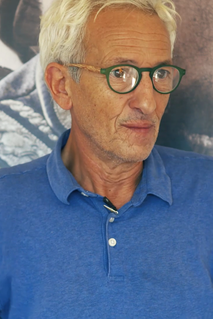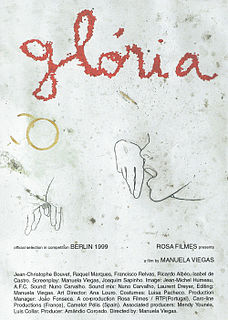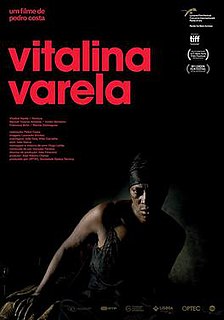
João Manuel Relvas Leopoldo Botelho is a Portuguese film director.

The Cinema of Portugal started with the birth of the medium in the late 19th century. Cinema was introduced in Portugal in 1896 with the screening of foreign films and the first Portuguese film was Saída do Pessoal Operário da Fábrica Confiança, made in the same year. The first movie theater opened in 1904 and the first scripted Portuguese film was O Rapto de Uma Actriz (1907). The first all-talking sound film, A Severa, was made in 1931. Starting in 1933, with A Canção de Lisboa, the Golden Age would last the next two decades, with films such as O Pátio das Cantigas (1942) and A Menina da Rádio (1944). Aniki-Bóbó (1942), Manoel de Oliveira's first feature film, marked a milestone, with a realist style predating Italian neorealism by a few years. In the 1950s the industry stagnated. The early 1960s saw the birth of the Cinema Novo movement, showing realism in film, in the vein of Italian neorealism and the French New Wave, with films like Dom Roberto (1962) and Os Verdes Anos (1963). The movement became particularly relevant after the Carnation Revolution of 1974. In 1989, João César Monteiro's Recordações da Casa Amarela won the Silver Lion at the Venice Film Festival and in 2009, João Salaviza's Arena won the Short Film Palme d'Or at the Cannes Film Festival. Several other Portuguese films have been in competition for major film awards like the Palme d'Or and the Golden Bear. João Sete Sete (2006) was the first Portuguese animated feature film. Portuguese cinema is significantly supported by the State, with the government's Instituto do Cinema e do Audiovisual giving films financial support.
Clara Law Cheuk-yiu is a Hong Kong Second Wave film director. Law currently resides in Australia.

O Fantasma is a 2000 Portuguese erotic drama film directed by João Pedro Rodrigues and produced by the independent production company Rosa Filmes.

April Captains is a 2000 film telling the story of the Carnation Revolution, the military coup that overthrew the corporatist dictatorship in Portugal on 25 April 1974. Although dramatised, the plot is closely based on the events of the revolution and many of the key characters are real - such as Captain Salgueiro Maia and Prime Minister Marcelo Caetano.

Alice is a Portuguese film directed by Marco Martins, released in 2005. Alice stars Nuno Lopes as Mário, the father, and Beatriz Batarda as Luísa, his wife, as well as Miguel Guilherme, Ana Bustorff, Gonçalo Waddington, Carla Maciel, Laura Soveral and José Wallenstein. Alice was produced by Paulo Branco. Music is by Bernardo Sassetti.
Joaquim Sapinho is a Portuguese film director. Founder of production company Rosa Filmes, he is considered to be part of The School of Reis film family.

Bosnia Diaries is a 2005 independent Portuguese documentary film directed by Joaquim Sapinho and produced at Rosa Filmes, which had its world premiere at the 2005 Pusan International Film Festival.

What's New About Love? is a 2011 Portuguese anthology film, consisting of six short-films, directed by Mónica Santana Baptista, Hugo Martins, Tiago Nunes, Hugo Alves, Rui Santos and Patrícia Raposo, produced by Rosa Filmes.

This Side of Resurrection is a Portuguese independent drama film written and directed by Joaquim Sapinho. It was produced by the independent production company Rosa Filmes and had its world premiere at the 2011 edition of the Toronto International Film Festival as part of the Visions programme.

The Policewoman is an independent Portuguese drama film directed by Joaquim Sapinho, produced at Rosa Filmes, which had its world premiere in 2003 at the Berlin International Film Festival.

Gloria is an independent Portuguese drama film directed by Manuela Viegas and written by Joaquim Sapinho, produced at Portuguese independent production company Rosa Filmes. The poster of the film was designed by Portuguese artist Julião Sarmento.
Manuela Viegas is a Portuguese film editor and director. She is considered to be part of The School of Reis film tradition.

The Lisbon Theatre and Film School of the Polytechnic Institute of Lisbon inherited the function of the National Conservatoire, founded by Almeida Garrett, in 1836, and of teaching Film, introduced in the same establishment since 1971. The main goal of the Lisbon Theatre and Film School is training in the fields of Theatre and Cinema. Sometimes it is still referred to by its former designation "Conservatório Nacional". It is a public institution of higher education created in Lisbon but now located in Amadora, Portugal.
Jan Bonny is a German film director and screenwriter.
The 1998 Golden Globes (Portugal) were the third edition of the Golden Globes (Portugal).

Horse Money is a 2014 Portuguese film directed by Pedro Costa. It premiered in August 2014 at the Locarno International Film Festival, where it won the award for Best Direction.
Juliana Rojas is a Brazilian filmmaker who was born in Campinas, São Paulo. She graduated in Cinema in Escola de Comunicação e Artes da USP where she met fellow Brazilian filmmaker Marco Dutra. This was the beginning of a long partnership between them. In 2004, while still in school, they codirected a short film called Lenço Branco. Their short film was part of a section of the Cannes Film Festival that is dedicated to university films, Cinéfondation. Three years later, in 2007, Um Ramo, another short film directed by Rojas and Dutra, would be nominated to Semaine de la Critique of Cannes Film Festival. In 2011, her first feature film would be premiered in the Festival, in the "Un Certain Regard" section. Her film, Good Manners was nominated in 2017 at the Locarno Film Festival. She has also worked as an editor.

Vitalina Varela is a 2019 Portuguese drama directed by acclaimed director Pedro Costa. It won the Golden Leopard and Best Actress Award at the 2019 Locarno Film Festival. The film follows Vitalina Varela, a character who previously appeared in Pedro Costa's Horse Money.
The Fever is a Franco-German-Brazilian drama and suspense movie directed by Maya Da-Rin. Spoken in Portuguese and in the indigenous languages Tukano and Tikuna, it is written by Maya Da-Rin, Miguel Seabra Lopes and Pedro Cesarino, and starred by Regis Myrupu and Rosa Peixoto. Its main cast is formed by indigenous actors from the Upper Rio Negro, belonging to the Desanos, Tucanos and Tarianas people, many of them whom had their first experience in cinema.













